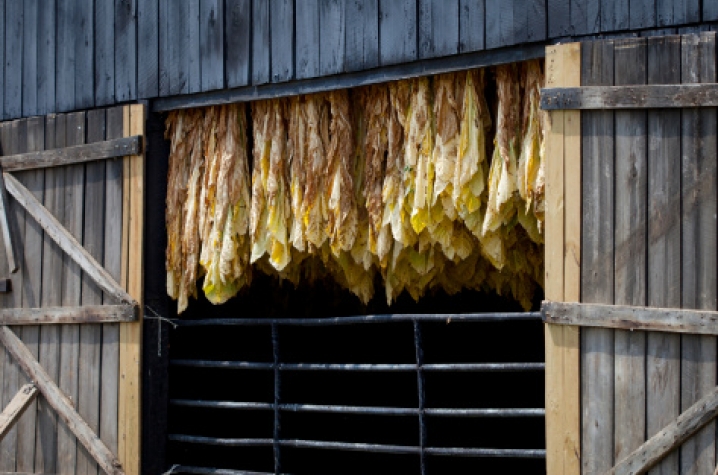UK College of Nursing Study Exposes Historical Barricades to Health in Tobacco-Growing States
LEXINGTON, Ky. (June 24, 2015) — The major tobacco-growing states lag behind the rest of the nation in adopting measures effective in reducing tobacco use. Consequently, these five states — Kentucky, North Carolina, Virginia, South Carolina and Tennessee — are disproportionately affected by tobacco related disease, the leading cause of preventable death.
Bringing light to this health disparity, a researcher in the University of Kentucky College of Nursing recently found tobacco companies prioritized holding back tobacco-growing states as tobacco-control policies, including smoke-free policies, passed across the nation.
Amanda Fallin, Ph.D., conducted a comprehensive review of historical data, including previously secret tobacco industry documents, which provided evidence of manufacturers aligning with farmers and tobacco-growing interest groups to block tobacco-control policies in the top growing states. Her paper, titled "Tobacco-Control Policies in Tobacco-Growing States: Where Tobacco was King," was recently published in The Milbank Quarterly, a multidisciplinary journal covering population health and health policy.
In the 1960s, tobacco companies began focusing on tobacco-control policies in tobacco-growing states. The companies ignited a pro-tobacco culture through a policy network of legislators, agricultural interest groups and commissioners of agriculture. Many previously clandestine documents sourced from tobacco manufacturers suggested these manufacturers were called to "circle the wagon" around tobacco-growing states.
After news of smoking's link to lung cancer was exposed by the media in the 1950s, tobacco manufacturers formed a national alliance called the Tobacco Growers Information Committee. Throughout the 1960s and 1970s, the committee funded a public relations campaign aimed at normalizing tobacco production. In the 80s and 90s, smoke-free legislation started to build momentum across the country. The National Cancer Institute (NCI) attempted to curb tobacco use through the Community Intervention Trial for Smoking Cessation (COMMIT), but only one tobacco-growing state, North Carolina, participated in the trial.
In the 1990s, North Carolina, Virginia and South Carolina participated in the NCI's American Stop Smoking Intervention study and alliances, such as the Southern Tobacco Communities Project, started to form between health organizations and farmers. A group of health and farming organizations came to together to acknowledge the need to preserve the livelihoods of tobacco farmers as well as prevent youth smoking initiation. The Core Principles statement, which summarized areas of agreement, was signed by more than 100 health and farming groups in 1998.
From 1990 to the turn of the century, a rift in the relationship between farmers and tobacco manufacturers preceded policy changes in tobacco-growing states. The demand for tobacco in the U.S. was declining and manufacturers were seeking foreign producers for cheaper tobacco prices. In addition, the hospitality industry, which in the past had supported tobacco use, broke its alliance with tobacco companies.
In 2003, a turnabout in tobacco-control policy acceptance was marked by the passing of the first countywide smoke-free ordinance in public places in a tobacco-growing state, Kentucky. Since then, all five states have progressed toward 100-percent smoke-free policies, in the midst of appeals, set-backs and compromises weakening legislation. Currently, Kentucky observes 24 comprehensive smoke-free laws at the local level. Most Kentucky colleges and universities have implemented 100 percent tobacco-free campus policies.
"Kentucky is changing," Fallin said. "There is a pro-tobacco sentiment because of our history, but there are dramatically fewer tobacco farmers compared to previous generations. There has been a shift in our way of thinking about tobacco, and progress is now occurring. The majority of Kentuckians support a comprehensive statewide smoke-free law."
While the tobacco-growing states have gained substantial ground enacting tobacco-control policies in the past decade, the article emphasizes these states must continue to educate policymakers and the public about the changing reality of tobacco. As of 2014, the average tax rate for a pack of cigarettes is $0.48 in tobacco-growing states, whereas the average is $1.68 in other states. Misconceptions about the cultural and economic value of tobacco continue to obstruct widespread acceptance of smoke-and tobacco-free policies. Fallin believes reducing the burden of lung disease in tobacco-growing states will require health advocates to reflect on old realities and acknowledge the changing environment.
"We are a tobacco growing state, but from an economic perspective, tobacco-related morbidity and mortality contributes to enormous cost to our health care system," Fallin said. "It's time to shift our thinking — to think about the potential for dramatic public health impact in Kentucky by adopting evidence-based tobacco policies like significant increases in tobacco excise taxes and smoke-free legislation."
MEDIA CONTACT: Elizabeth Adams, elizabethadams@uky.edu






